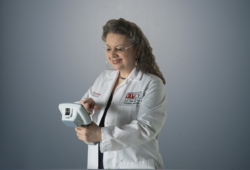Standardizing rapid diagnostics could play a major role
In an effort to reduce mortality and morbidity rates, the 2020–2025 National Action Plan for Combating Antibiotic-Resistant Bacteria from the Centers for Disease Control and Prevention (CDC) recommends furthering the development and implementation of rapid diagnostic tests for identifying antibiotic-resistant bacteria.
The CDC defines its goal as reducing the time to identify the pathogen and administer effective antibiotic therapy. Included in that goal is the need to speed up getting the right antibiotics to patients who’ve had ineffective or suboptimal initial therapy. To that end, a study at a HealthTrust member hospital tested a rapid nucleic acid microarray test. The aim of the study was to determine if the time spent pinpointing effective antibiotic therapies could be more effective, while reducing the time spent on potentially ineffective or suboptimal initial therapies.
Improving timely diagnoses

The test took place at Tenet Healthcare’s Princeton Baptist Medical Center in Birmingham, Alabama, comparing the speed and standards of rapid tests. Conventional testing requires growing enough of an organism in culture, and it can take several days before an organism can be identified and tested for antimicrobial susceptibility. Faster tests now have the capability to yield results in a few hours, utilizing nucleic acid amplification to identify resistance markers in positive cultures.
Kenda Germain, PharmD, BCPS, Clinical Pharmacy Specialist, acts as the pharmacy lead for the Antimicrobial Stewardship Committee at Princeton Baptist. She created the policies and procedures around the reporting of Verigene results, determining who would receive the results and how they would be documented, as well as training the clinical pharmacy staff and medical staff on how to interpret them.
The results were significant: The rapid test took an average of 33 fewer hours than older tests. This could make an important difference in treating bloodstream infections (BSIs). With BSIs, every hour that antibiotic treatment is delayed results in a 7% increase in mortality risk.
In addition to the human impact of these infections, there is a financial and logistical impact, as time spent on ineffective therapies means more time the patient may need to stay in the hospital. A faster track to an accurate diagnosis and treatment means freeing up beds and staff as well as sending patients home healthier and more quickly.
“I believe the results of this program speak to the value of investing in new technology and ideas to improve patient care,” Germain says, “and demonstrates the impact that pharmacists can have on improving outcomes for our patients. By supporting programs like this, Tenet Healthcare is encouraging innovation that improves providers’ ability to best care for their patients and demonstrating a commitment to providing top quality care.”
The need for standardization

Tenet Healthcare, headquartered in Dallas, operates hospitals, surgical care facilities and provider-based clinics in 28 states. The Ancillary Services team is seeking to improve the implementation and standardization of rapid molecular tests within the Tenet system. “We’ve identified with our national lab director that there are inconsistencies with regard to vendors and which test each vendor supplies across our facilities,” adds Toby Cooper, Director for Clinical Pharmacy Services at Tenet. “We are making recommendations to standardize what technology and tests we use in our facilities. And that’s part of the connection with HealthTrust as our GPO [group purchasing organization] partner. It helps us negotiate with those vendors and that benefits the standardization process.”

While the less time a patient is in the hospital means less expense for the facility, the rapid tests themselves are not inexpensive, making measures to standardize even more important. “It’s more expensive per test than conventional testing,” explains Rick Soto, Tenet’s National Director of Pharmacy Operations, “so that does have to be accounted for when you look at actual cost savings.”
Standardizing across the Tenet system would create value in several ways. “One focus of this pilot study was to look at time to effective antibiotic use, and then optimizing antibiotic use,” Cooper explains. “We know that the longer it takes to provide effective antibiotic therapy to patients, the more the risk for poor outcomes increases. Our acute care hospital programs are accredited by The Joint Commission. The focus of The Joint Commission is to standardize policy and process and to decrease the potential risks for error or poor outcomes. Standardizing these tests leads to standardized purchasing and procedures, all of which can improve outcomes in terms of patient health and reducing overall costs.”
Standardization and implementation of rapid tests also aligns with the goals outlined in the CDC’s National
Action Plan for Combating Antibiotic-Resistant Bacteria. The plan seeks “improved antibiotic stewardship in healthcare settings” as well as the “prevention of the spread of drug-resistant threats.”
Tenet’s Ancillary Services team sees the outcome of Princeton Baptist’s investigation of rapid tests as providing an opportunity. It will allow Tenet facilities to promote and improve the use of tools available to them as part of Antibiotic Stewardship Programs and best practice efforts. “The appropriate use of antibiotics is a national priority,” Cooper says. “I think this highlights the importance of identifying what technologies we can use and what we need to advance. As we identify best practices at Tenet, we can standardize them across the system so patients get the same standard of care they would in any of our acute care facilities.”
For more information, contact your HealthTrust Account Manager or visit Lab Solutions.
Share Email Antimicrobial Stewardship, Diagnostics, Q1 2024




